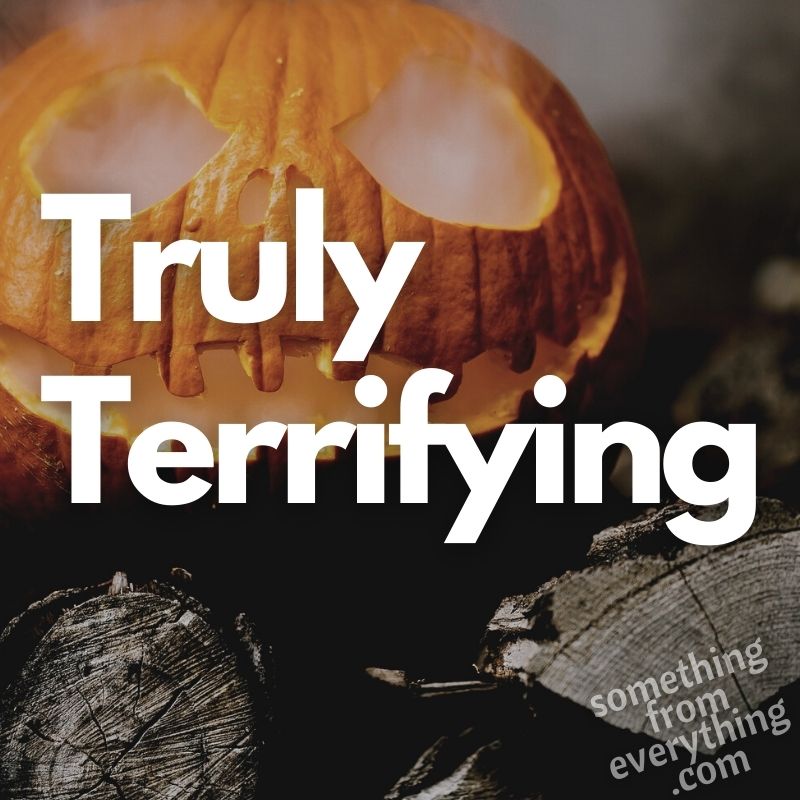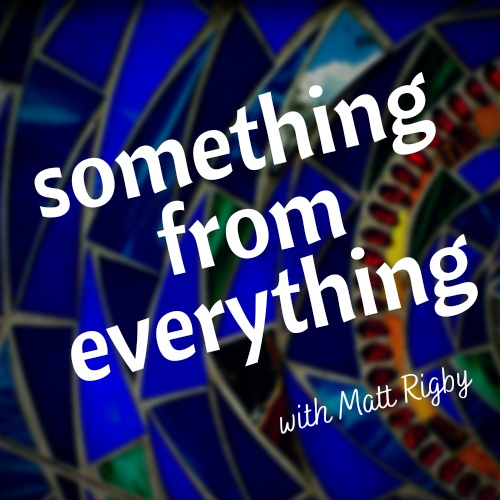
The robotic clown towers above us, breathtaking and menacing. He is impossibly tall, maybe 7 or even 8 feet on top of his small stand. The stand’s speaker spews sinister circus music as the animatronic monster reaches a hand forward to ask for a volunteer for his juggling act.
“I just need a hand… and a foot… and a head… any body part will do!”. The clown breaks out in maniacal laughter, and my 7 year old presses in against my side, even closer than he had been before. His gaze flits quickly between the towering monstrosity and me. I worry momentarily that we’ve come too close, that the nightmare fuel will burn each and every bedtime this week, or maybe this month. I suppress a grin and open my eyes wide at him, acknowledging my possible failure as a parent and gatekeeper of all things inappropriate for 7 year olds. His face breaks into a giant, nervous grin.
“Dad, this is awesome”.
I couldn’t agree more. This is halloween: the wet chill and low hanging fog in the air, the glow of orange from freshly carved and lit jack o’lanterns; children running reckless from doorstep to doorstep, pillow cases pregnant and nearly unliftable, dragged or begrudgingly carried by parents; neighbours around a propane fire, offering hot chocolate from a thermos to warm kids and parents alike; and sights and sounds that teeter on the knife’s edge of terrifying and exciting.
You have to know your audience. Not every child should be subjected to maniacally laughing animatronic clowns. I certainly wouldn’t have enjoyed it at his age. My youngest was drawn to the spectacle of it while we were still a long ways off. The rolling fog illuminated by brightly coloured light, the excited (and terrified) screams of children running to or away from the house. While we were slowly winding up an adjacent cul-de-sac, my youngest would crane his neck to see this particular house. He wanted to see it.
He comes by it naturally. At our house we have more Halloween decorations than all other holidays combined (those wooden gravestones and plastic skeletons take up more than their fair share of room under the stairs). And we much prefer setting up the halloween ones. When else do you get to cover the trees with cobwebs and plastic spiders, or create shallow graves out of wooden tombstones and left over planting soil?
It is, admittedly, not for everyone. Not everyone enjoys Halloween as much as I do, or even at all. But it is on offer to everyone. It demands little, but accepts much.
Want to turn all your dead summer flowers into graveyard decor? Go for it. Want to turn your entire residence into a haunted house? Have at it. Want to play “Thriller”, “Monster Mash” and “Ghostbusters” on endless repeat for all the neighbours to hear? You might get a visit from bylaw, but I won’t judge you.
If you’re feeling less in the spirit, a simply lit jack-o-lantern and a ready supply of candy is enough buy-in to be considered a full participant. Even those that give out toothbrushes, toothpaste and floss play a needed (and completely thankless) role on Halloween.
With so many participating on halloween, you notice the ones who don’t. Those who don’t appear to enjoy the spectacle. The houses that are completely dark, intentionally uninviting from the street. It’s obvious that so much of the imagery of Halloween is full of grotesquery and gore, hell and hedonism, devils and darkness.
Perhaps they can’t see past the pageantry. Perhaps all they see is evil.
It’s strange, isn’t it? How some of us see evil as real and threatening, while others see it as only a lark? Personally, I don’t think Halloween is evil in the slightest. There’s far too much goodness there. I realize that the surface of Halloween may appear grotesque, but in my experience, the heart of Halloween is communal celebration.
That’s not to say that I don’t believe in an evil that threatens us. I just don’t think it looks anything like the imagery halloween supplies.
You see, I was formed in a religious tradition that talked about evil all the time. We believed in evil, were on the watch for evil, and praying to be delivered from evil. And when I felt I had grown apart from that tradition, I realized that I didn’t know what to do with a lot of religious concepts, including the concept of evil. What once I considered evil, I began to see as actions that are explainable as self serving, ignorant, or misguided. And now? I’m starting to examine a lot of the concepts that I previously discarded.
I think this is the case for a lot of us. That either we believe evil is concrete, obvious and identifiable, or that we think of it as a concept that is outdated, antiquated, and either useless, or perhaps, harmful. Unfortunately, I think both of these views miss the mark. I don’t think most of us believe in, or understand much about the nature of evil at all.
The Franciscan friar Richard Rohr says as much in his recent book, “What Do We Do WIth Evil?”. Obviously, as an identified Catholic Franciscan, Rohr belongs to a very old and religious tradition, but I find his words on evil accurate and contemporary. Rohr argues that evil is not overt and obvious, but is subtle and insidious. It’s less the stories of demon-clowns devouring children, and more the true stories of children being devoured and traumatized by institutions of power and privilege that we esteem, trust and support (and even belong to). It is less about the spectacle of the monstrous and inhuman, and more about the devastation of dehumanizing those who are ‘other’ from us. While Rohr’ draws on the biblical language of “principalities and powers” of darkness, he states that these might be more familiar in our context as ideologies, organizations, corporations or institutions.
Here is a recent example from a well known corporation that we are all very much aware of: A few weeks ago Frances Haugen stepped forward as a whistleblower against Facebook, stating that the company had repeatedly prioritized profits over the safety and well being of its patrons. She claims that Facebook repeatedly hid or ignored information of their role in promoting misinformation, of not removing hate speech, and ignoring links between consistent use of Instagram and suicidal ideation in young girls.
As time has passed, and further investigations have been launched, these have become only the initial allegations. And if any of these allegations turn out to be true, what do you call actions and decisions like that? I think we need to call those actions ‘evil’.
I know that ‘evil’ is a loaded term. A term that many of us relegate only to the religious and superstitious. Maybe some would argue that Facebook is only guilty of being self-interested and self sustaining. That they are merely acting in ways that countless other organizations and corporations do.
But that sounds pretty evil to me. I have no doubt that we could explain away any organization’s harmful actions as originating in that which is self serving, ignorant or misguided. But what emerges seems greater than the sum of its parts. If we argue that the term ‘evil’ is antiquated and outdated, we need an appropriately weighty term to take its place. To explain these actions as simply a “corporate oversight”, or “misstep”, seems woefully inadequate. They don’t do the harm justice.
Of course, we’re talking about more than Facebook. We could be talking about any ideology, institution, organization or corporation that gets a pass from us, that we even find ourselves defending when we know they’re doing harm. It’s all the ways that we are both willingly and thoughtlessly bound up with it.
Perhaps that is evil’s greatest trick: that it does not come to us as a devil or monster, but as that which is commonplace and accepted. It’s not only the ways that a company chooses profits at the expense of people, but it also exists in the ways I find myself enmeshed in, and dependent on that same institution, company, or organization when I believe they are doing evil.
Evil isn’t announcing itself with pitchforks and horns, it’s hiding in the places we excuse or even expect it.
We need to think, and re-think about evil, especially in these days when many of us no longer believe in it. Imagine if we always expected evil to be either a hideous, monstrous demon, or an unnecessary, outdated notion. Imagine if we never developed the awareness to see evil working in plain sight.
Now that would be truly terrifying.

Leave a Reply